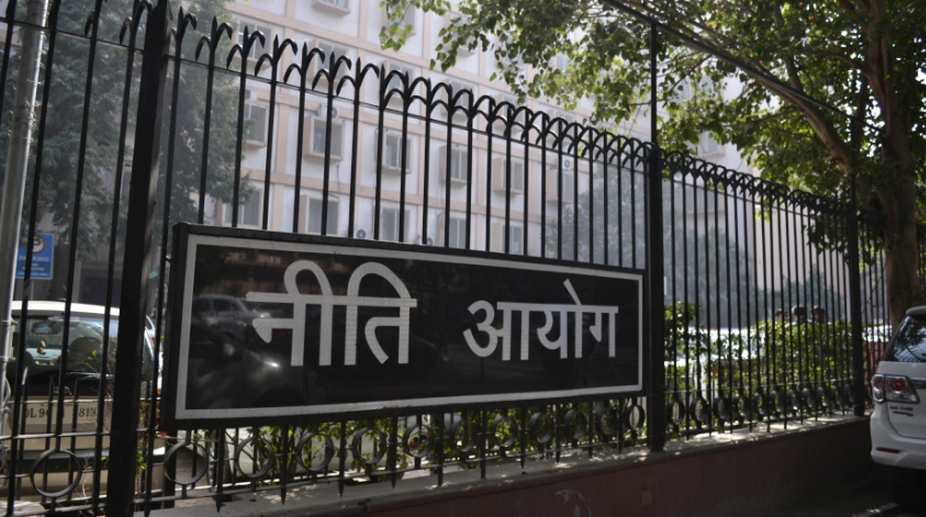Afew weeks ago, the Vice-chairman of NITI (National Institution for Transforming India) Aayog sent his resignation to Prime Minister, Narendra Modi saying he was not getting an extension of leave from his employer, Columbia University, where he had been serving as a professor. The Government has appointed Prof. Rajiv Kumar, an economist, in his place. In parallel, Dr. Vinod Paul, who is serving at All India Institute of Medical Sciences (AIIMS) was also nominated as member NITI Aayog. Media reports suggested that Arvind Panagariya has perhaps resigned due to ‘criticism’ from Swadeshi Jagran Manch and Bhartiya Mazdoor Sangh, both organizations affiliated with RSS.
NITI Aayog came into existence in January 2015. Prime Minister Narendra Modi announced that a new system would replace the Planning Commission. While NITI Aayog was being constituted, the Prime Minister had said that while working as Chief Minister of Gujarat, he realised that states always had to approach Planning Commission with a begging bowl.
Advertisement
The Centre makes policies and programmes which states have to follow, whether they want them or not. Therefore there was a need to have cooperative federalism. A ‘One Size Fits All’ approach was no good; therefore programmes had to be tailor made for states. There was need to have a ‘Bottom to Top’ approach in place of a ‘Top to Bottom’ one. Therefore NITI Aayog was seen as an instrument of states’ empowerment. NITI Aayog was devoid of power to allocate funds, which Planning Commission possessed. NITI Aayog was considered not as a power centre, but as a ‘think tank’.
The natural expectation from NITI Aayog was that along with GDP growth it would focus on other challenges faced by the nation namely, poverty, unemployment, deprivation, inflation etc. Programmes would be chalked out to meet these challenges, after consulting the states, based on the principle of co-operative federalism. Since NITI Aayog was envisaged as a think tank, it was naturally expected that it would work with an open mind, and not under any pressure. Policies and programmes would be made according to the needs and conditions of the states.
However, NITI Aayog despite being equipped with huge workforce of statisticians, officers and experts, failed to make a solid policy document, even to make a start in this regard. It could not even make any headway on the long pending issue of finding a suitable definition of poverty.
Instead of finding solutions to the long standing challenges of poverty, unemployment and deprivation, NITI Aayog’s attention was mainly on issues which were connected with interests of the big corporates, including MNCs. Issues ranging from giving permission to GM crops to dismantling of price control mechanism for pharma prices (so that interests of Pharma companies are not hurt), attracted the attention of the NITI Aayog. It even hired international consultancy firms, to take forward this agenda.
The declared objectives and structure of NITI Aayog are really appreciable. As we understand, we have bid farewell to planning and the role of private sector has increased enormously. Therefore need was being felt that there should be a think-tank guiding the government, free from the responsibility of allocating resources. Even Ex-Prime Minister Manmohan Singh had indicated the need for this shift from Planning Commission. However, the issue of utmost importance is about the choice of people to spearhead this task. After Arvind Pangariya’s resignation, government decided to appoint an Indian economist to lead the NITI Aayog. Minimum expectation from the vice chairman and members of NITI Aayog is that they would understand the problems of this country closely. Need of the hour is to have inclusive development and not just corporate-based GDP growth.
Inclusive development means development where farmers get remunerative prices for their produce, workers get due share in production, health and education are easily and appropriately available to the masses and incomes are more or less equally distributed. Our youth gets employment and farms get irrigation. A criterion of development is not development of big cities only; rural development gets equal attention. For this, minimum requirement is that people sitting in NITI Aayog should be sensitive to the problems of farmers, workers, the unemployed and deprived.
It would be appropriate to state that there are two schools of thought about development in the world. One is represented by the Prof. Jagdish Bhagwati-Arvind Panagariya combine and the other by Prof. Amartya Sen. First approach states that we should merely concentrate on GDP growth. If we have high rate of growth of GDP, its benefits would automatically accrue to the poor and deprived. According to this approach the only way to reach high rate of growth of GDP is globalisation and free trade.
According to the other approach, represented by Prof. Sen, while free trade and globalisation are inevitable, they lead to inequalities and poor are not able to fulfill their basic needs. Therefore, to overcome their problems, the poor must be provided with food security, employment guarantee, and health facilities etc.
If we look deeply, neither of these approaches is appropriate for a country like India. Both approaches have corporate interests in focus. Both do not talk of employment generation and talk about jobless growth. The poor are left in the lurch in the Bhagwati-Panagariya approach and at the government’s mercy in the Amartya Sen approach.
Away from these two approaches, there is the imperative of a third approach. An approach where small scale and cottage industries get attention keeping corporate interests at bay, where farmers get remunerative prices for their produce, where employment generation gets priority along with GDP growth. Everybody has a fair chance to be employed and earn a livelihood, so that he/she is not left to look at the government for fulfillment of basic needs, including food, shelter, education and health.
The writer is Associate Professor, PGDAV College, University of Delhi.









